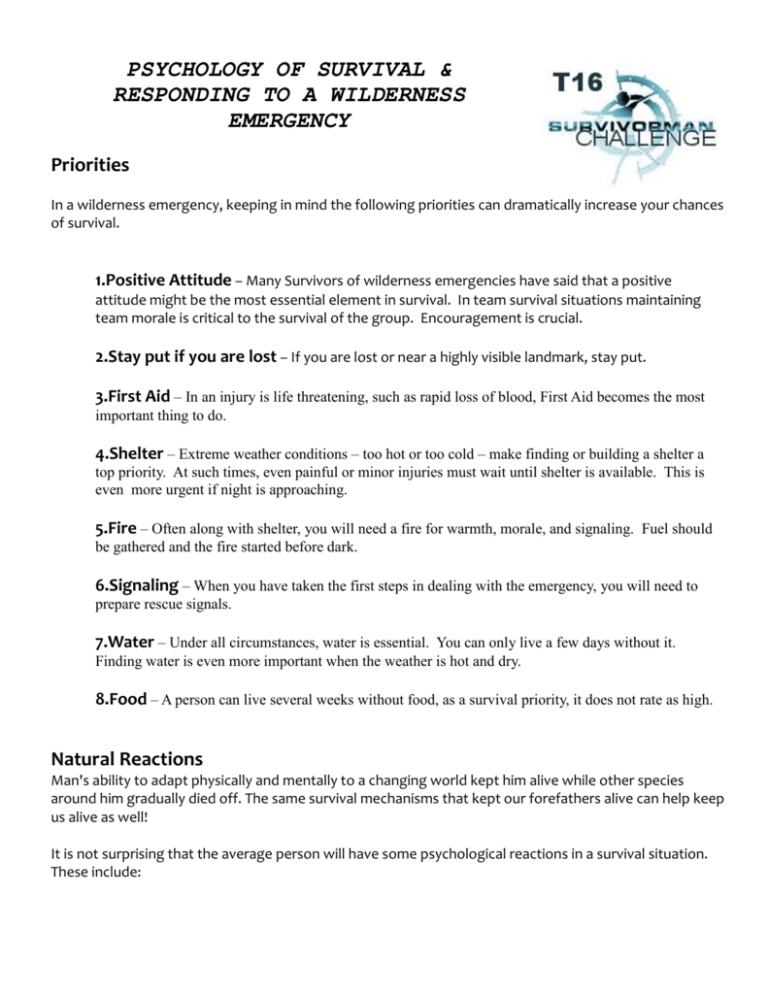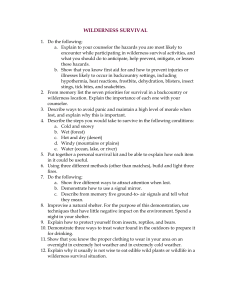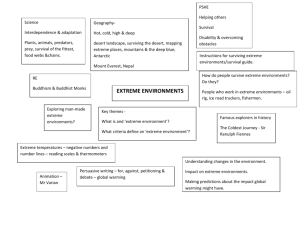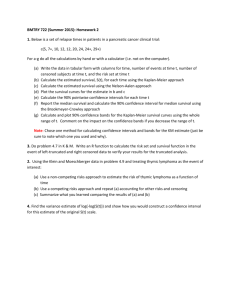Psychology – Emergency Response
advertisement

PSYCHOLOGY OF SURVIVAL & RESPONDING TO A WILDERNESS EMERGENCY Priorities In a wilderness emergency, keeping in mind the following priorities can dramatically increase your chances of survival. 1.Positive Attitude – Many Survivors of wilderness emergencies have said that a positive attitude might be the most essential element in survival. In team survival situations maintaining team morale is critical to the survival of the group. Encouragement is crucial. 2.Stay put if you are lost – If you are lost or near a highly visible landmark, stay put. 3.First Aid – In an injury is life threatening, such as rapid loss of blood, First Aid becomes the most important thing to do. 4.Shelter – Extreme weather conditions – too hot or too cold – make finding or building a shelter a top priority. At such times, even painful or minor injuries must wait until shelter is available. This is even more urgent if night is approaching. 5.Fire – Often along with shelter, you will need a fire for warmth, morale, and signaling. Fuel should be gathered and the fire started before dark. 6.Signaling – When you have taken the first steps in dealing with the emergency, you will need to prepare rescue signals. 7.Water – Under all circumstances, water is essential. You can only live a few days without it. Finding water is even more important when the weather is hot and dry. 8.Food – A person can live several weeks without food, as a survival priority, it does not rate as high. Natural Reactions Man's ability to adapt physically and mentally to a changing world kept him alive while other species around him gradually died off. The same survival mechanisms that kept our forefathers alive can help keep us alive as well! It is not surprising that the average person will have some psychological reactions in a survival situation. These include: Fear - Fear is our emotional response to dangerous circumstances that we believe have the potential to cause death, injury, or illness. Fear can have a positive function if it encourages you to be cautious in situations where recklessness could result in injury. Unfortunately, fear can also immobilize a person. Most people will have some degree of fear when placed in unfamiliar surroundings under adverse conditions. There is no shame in this! Anxiety - Associated with fear is anxiety. Because it is natural for us to be afraid, it is also natural for us to experience anxiety. Anxiety can be an uneasy, apprehensive feeling we get when faced with dangerous situations (physical, mental, and emotional). Anger and Frustration - Frustration arises when a person is continually thwarted in his attempts to reach a goal. The goal of survival is to stay alive until you can reach help or until help can reach you. To achieve this goal, you must complete some tasks with minimal resources. It is inevitable, in trying to do these tasks, that something will go wrong; that something will happen beyond your control; and that with one's life at stake, every mistake is magnified in terms of its importance. Thus, sooner or later, you will have to cope with frustration when a few of their plans run into trouble. If you do not properly focus your angry feelings, you can waste much energy in activities that do little to further either your chances of survival. Depression - It would be a rare person indeed who would not get sad, at least momentarily, when faced with the privations of survival. As this sadness deepens, we label the feeling "depression." Depression is closely linked with frustration and anger. When a person reaches this point, he starts to give up, and his focus shifts from "What can I do" to "There is nothing I can do." If you allow yourself to sink into a depressed state, then it can sap all your energy and your will to survive. It is imperative that you resist succumbing to depression. Loneliness and Boredom - Man is a social animal. This means we, as human beings, enjoy the company of others. Very few people want to be alone all the time! As you are aware, there is a distinct chance of isolation in a survival setting. This is not bad. Loneliness and boredom can bring to the surface qualities you thought only others had. The extent of your imagination and creativity may surprise you. Guilt - The circumstances leading to your being in a survival setting are sometimes dramatic and tragic. It may be the result of an accident or emergency where there was a loss of life. Perhaps you were the only, or one of a few, survivors. While naturally relieved to be alive, you simultaneously may be mourning the deaths of others who were less fortunate. It is not uncommon for survivors to feel guilty about being spared from death while others were not. Do not let guilt feelings prevent you from living. The living who abandon their chance to survive accomplish nothing. Such an act would be the greatest tragedy.








